David Tickner's Blog, page 21
July 6, 2022
Knackler
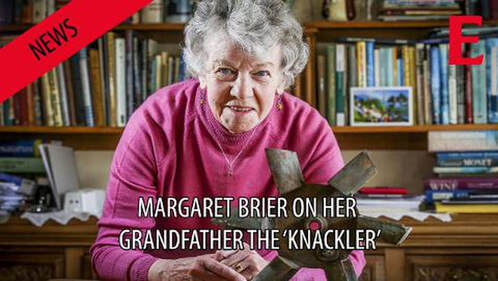 A knackler is a person capable of mending anything with anything. The word, from Yorkshire, UK, is used as a compliment; for example, “He’s a canny knackler is our dad. He can men owt wi’ nowt!”
A knackler is a person capable of mending anything with anything. The word, from Yorkshire, UK, is used as a compliment; for example, “He’s a canny knackler is our dad. He can men owt wi’ nowt!”The origins of the word knackler are uncertain; perhaps from knack, meaning a deception, trick, or device, which appears in English in the mid-14th century. Knack may be related to German knacken (to crack). Knack, a special skill in some specified activity, is first seen in the 1580s.
Margaret Brier, 76, of Upperthong, Yorkshire, UK, is the granddaughter of inventor and self-confessed knackler Harry Bates (1865 - 1951). Margaret, who was just 12 when her grandfather died aged 86, has written a book about him called Whitley Willows.
Harry was a man ahead of his time. As a young man in the late 19th century, he built a water-powered electricity generator in his back yard. He also made his own gramophone, a circular saw driven by a motorcycle engine, a drilling machine and lathe, a wireless set, and a central heating system. Harry worked for forty years as an engineer at the Whitley Willows Textile Mill.
Margaret says that Harry was always willing to have a go at something; i.e., knackling. He described himself as a “bit” of a motor engineer, a “bit” of an electrical engineer and a “bit” of a steam engineer.
Margaret writes that he also built an electric mangle to wring water from the clothes coming out of the washing machine at her grandparent’s home. Margaret said, “My grandfather was fed up with arguing over who turned the handle so he electrified it!”
Reference: Online Etymological Dictionary, https://www.etymonline.com/
https://www.definition-of.com/Knackler
https://www.examinerlive.co.uk/news/west-yorkshire-news/huddersfield-inventor-self-confessed-knackler-11271332
Published on July 06, 2022 08:18
July 3, 2022
Tree, Trust, Truth
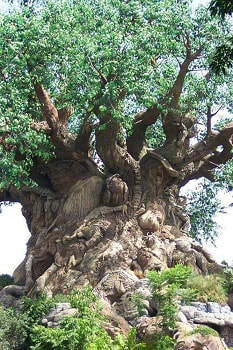 The words tree, trust, and truth all have their origin in the Proto-Indo-European (PIE) root deru (to be firm, solid, steadfast).
The words tree, trust, and truth all have their origin in the Proto-Indo-European (PIE) root deru (to be firm, solid, steadfast).Consider the thought that trees, trust, and truth all begin as seeds from which they grow and develop and mature over the years.
The word tree has its origins in PIE deru and Old English treo, treow (tree). The Old English word for a woodworker or carpenter was treowwyrhta (treewright).
The noun trust and the verb ‘to trust’ have their origins in PIE deru and Old English treowian (to believe, trust) and treowe (faithful, trusty). The word trust (reliance on the veracity, integrity, or other virtues of someone) came to English in the 13th century. In the 14th century, the word trust also meant reliability, trustworthiness, fidelity, faithfulness, and confident expectation. In the 15th century, the word trust took on legal connotations; e.g., property or goods held ‘in trust’ or ‘entrusted’ to another.
The word truth has its origins in PIE deru, Proto-Germanic treuwaz (characterized by good faith), and Old English treowd (faith, faithfulness, fidelity, loyalty, veracity, the quality of being true). The Old English word for ‘true love’ is treowlufu (love that is as steadfast as a tree). Such origins suggest that truth is something in the heart rather than the head; something that you do rather than something that you have.
Truth, meaning accuracy or correctness, is from the 1560s.
Interestingly, English and other PIE languages have the verb ‘to lie’ (to tell an untruth) but there is no verb meaning ‘to tell the truth’. That is, English speakers can ‘lie’ about something but they can not ‘truth’ about something!
Reference: Online Etymological Dictionary, https://www.etymonline.com/
Published on July 03, 2022 13:22
June 26, 2022
Algorithm, Algebra
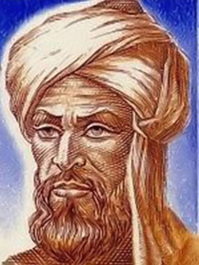 When you think of algorithms and algebra, does bone-setting come to mind?
When you think of algorithms and algebra, does bone-setting come to mind?The concept of algorithms has existed since ancient times and was used by the Babylonians as early as 2500 BCE and later by the Egyptians and Greeks.
The word algorithm, meaning an Arabic system of computation, came to English in the 1690s from Old French algorisme and Latin algorismus.
These words are a mangled transliteration of al-Khwarizmi, the surname of Muhammad ibn Musa al-Khwarizmi (780 – 850 CE), a Persian mathematician, astronomer, and geographer from Uzbekistan who lived and worked in Baghdad and whose work introduced sophisticated mathematics to Western European. His work in Arabic was translated into Latin in the 12th century (also known as ‘the century of learning’). He is noted for introducing ‘Arabic numbers’ to Europe which quickly replaced ‘Roman numerals’. He was the best-known mathematician in Europe during the Middle Ages.
One of al-Khwarizmi’s most famous books was called the al-mukhtasar fi hisab al-jabr wa al-muqabala (the compendium on calculation by restoring and balancing), a book more simply known as al-jabr (the reunion of broken parts), from Arabic jabara (reintegrate, reunite, consolidate). This book is better known in English as The Algebra.
Originally, the word algebra was pronounced ‘al-JE-bra’ in the Arabic fashion. In the 17th century, the pronunciation shifted to AL-je-bra.
Interestingly, speaking of the ‘reunion of broken parts’, during the 15th and 16th centuries the English work algebra also meant ‘bone-setting’, a usage likely derived from the influence of Arab physicians working in Spain.
Reference: Online Etymological Dictionary, https://www.etymonline.com/
Published on June 26, 2022 11:12
June 21, 2022
Broker
 The next time you meet with a broker (stockbroker, insurance broker, real estate broker, customs broker, pawn broker), you might casually ask, “Did you know that the words broker and broccoli are cousins?”
The next time you meet with a broker (stockbroker, insurance broker, real estate broker, customs broker, pawn broker), you might casually ask, “Did you know that the words broker and broccoli are cousins?”The words broker and broccoli both come from Latin broccus (projecting, pointed; especially pointed teeth). Also, Gaelic brog means an awl. The similarity of these Latin and Gaelic terms suggests that there may be an as yet unknown common origin in Proto-Indo-European (PIE).
Latin brocca (a pointed tool), from broccus, is the source of 12th century Old French broche (a spit for roasting meat, an awl, the pointed end of something), words which came to English around 1300 as broach (a pointed instrument).
Latin brocca and Old French broche are also the source of Old French brocheor (someone who would broach, tap, or pierce a keg; i.e., a brocheor was a wine dealer). In the mid-14th century, the English word broker came to English from brocheor. At that time, a broker was a commercial agent (often an agent in a sordid business). Also at that time, a broker was a term used contemptuously of peddlers and pimps as well as of one who buys and sells public office. In the late 14th century, a ‘marriage broker’ was an intermediary in love or marriage—perhaps someone who ‘pointed’ two people toward one another?!
What about broccoli? This word also has its origins in Latin broccus and brocco (a shoot, a protruding tooth, a small nail) and Italian broccolo (a sprout). In Italian, the plural of broccolo is broccoli (many sprouts, a cluster of many sprouts). The word broccoli came to English in the 1690s.
Bonus: Speaking of pointed tools, if you own a piece of jewellery known as a brooch, you fasten the brooch to your clothing with the attached pin known as a broach.
Reference: Online Etymological Dictionary, https://www.etymonline.com/
Published on June 21, 2022 19:59
June 16, 2022
Coach
 In the 16th century town of Kocs in Hungary, an unknown craftsman designed and built a new type of four-wheeled covered carriage that was bigger and more comfortable than any others of the time. In Hungarian, the carriage was called a Koczi szeter; i.e., a wagon from Kocs. Over time, the carriage became known simply as a kocsi.
In the 16th century town of Kocs in Hungary, an unknown craftsman designed and built a new type of four-wheeled covered carriage that was bigger and more comfortable than any others of the time. In Hungarian, the carriage was called a Koczi szeter; i.e., a wagon from Kocs. Over time, the carriage became known simply as a kocsi.In German, a kocsi became known as a kutsche, in French it was known as a coche, and in English, it became known as a coach. Variations on coach include a stagecoach, railway train coach (1866), and motor coach (a bus). By 1949, airlines used the term coach class in reference to economy or tourist class.
How did the word coach come to mean a word for an instructor or trainer? In the 1830s, coach was a slang term at Oxford University for a private tutor who ‘carried’ a student through to an exam.
By 1849, the verb ‘to coach’ meant to tutor, to give private instruction to, and to prepare someone for an exam or contest. Similarly, the word coacher was someone who trained athletes for a contest. By 1861, coacher had shortened to coach. In short, a coach ‘carries’ people who need help or guidance when learning.
In ancient Greece, the word agonia (the source of the word agony) meant the struggle for the prize in public games and athletic contests. An athletic trainer was an agonistarkhes (one who trained someone to compete). I guess if it hadn’t been for the Hungarians, today we would hear benched players crying out, “Put me in, Agonistarkhes, I’m ready to play today!”
Reference: Online Etymological Dictionary, https://www.etymonline.com/
Published on June 16, 2022 12:08
June 12, 2022
Lucifer
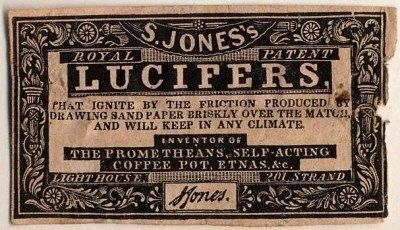 What comes to mind when you hear the word lucifer? Do you think of the planet Venus in the morning sky before sunrise? Or of bearing children? Or of a box of matches?
What comes to mind when you hear the word lucifer? Do you think of the planet Venus in the morning sky before sunrise? Or of bearing children? Or of a box of matches?The word lucifer has its origins in Proto-Indo-European (PIE) leuk (light, brightness) and bher (to carry, to bear children). PIE leuk is the source of Latin lux (light). The Latin word lucifer meant ‘light bearing’ or ‘carrying the light’. It also referred to the ‘morning star’; i.e., the planet Venus in the early morning sky.
So how did this word come to be the name for a devil?
The Online Etymological Dictionary states that the connection of lucifer and the devil has its origins in translations of an Old Testament Biblical verse, Isaiah 14.12, “How you have fallen from heaven, oh morning star, son of the dawn!” The original Hebrew term for ‘morning star’ was translated into Greek as Phosphoros and into Latin as Lucifer (meaning, among other things, a fallen angel or devil).
Speaking of devils, in 1589, Peter Binsfeld, a German bishop and theologian as well as a noted witch-hunter, produced a document which classified various devils according to each of the seven deadly sins. Each sin had its own room in hell and its own unique torment. In Binsfeld’s view of hell, Lucifer governed the room reserved for pride (the deadliest of the seven sins) in which the damned were tortured and ‘broken on the wheel’.
In contrast, St Lucifer is a noted saint from 4th century Sardinia.
During the 19th century Industrial Revolution in the UK, the lucifer match or friction match was invented. Anyone could now easily light a fire. Originally, the match tip contained white phosphorus, a highly toxic and disfiguring substance for the girls and young women who made the matches. Sounds to me like another room in hell. One of the most famous early examples of industrial action in the UK was the Matchgirls Strike of 1888 when 1,400 women walked off the job in protest of such working conditions.
A famous song of World War One, Pack up your troubles in your old kit bag, referred to the use of a lucifer to light your cigarette and, “Smile, smile, smile!” Indeed.
Reference: Online Etymological Dictionary, https://www.etymonline.com/
A short but gruesome history of the match
https://medium.com/study-of-history/a-short-history-c52a80c69d5e
https://en.wikipedia.org/wiki/Matchgirls%27_strike
Published on June 12, 2022 07:47
June 7, 2022
Decadence
 Decadent. Decadence. Decade. Do you get to be decadent every ten years? Or only for ten years? What does the word decadence have to do with the word decade? Nothing, as it turns out.
Decadent. Decadence. Decade. Do you get to be decadent every ten years? Or only for ten years? What does the word decadence have to do with the word decade? Nothing, as it turns out.The word decadence has its origins in the Proto-Indo-European (PIE) root kad (to fall) and Latin decadere (to decay); i.e., Latin de- (apart, down) + Latin cadere (to fall). To decay is to fall down.
In the 1540s, the word decadence appeared in English meaning decay or a deteriorated condition. The use of decadence to mean the process of falling away from a better or more vital state is from the 1620s.
In 1837, the term decadent was defined as a state of decline or decay from a former condition of excellence.
The word decadence has been used since 1852 to describe various periods of art. That is to say, decadent art is a falling away from traditional ways of doing art and from traditional subjects for art. The Tate Gallery of Modern Art in London uses the term decadence to describe a late 19th century style of art which emphasizes or over-emphasizes the spiritual, the morbid, and the erotic (an interesting mix of subject matter)!
The term decadent was used in the 1970s to describe desserts which appealed to the sense of satisfying a person’s self-indulgence. Today, the words decadent and decadence refer not only to decline and decay but to this sense of over-the-top self-indulgence.
Reference: Online Etymological Dictionary, https://www.etymonline.com/
https://www.tate.org.uk/art/art-terms/d/decadence
Published on June 07, 2022 20:05
June 3, 2022
Amazon
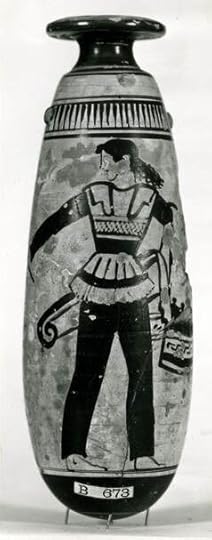 The origins of the word Amazon are unknown. The word came unchanged to English in the late 14th century from the Latin and Greek word Amazon.
The origins of the word Amazon are unknown. The word came unchanged to English in the late 14th century from the Latin and Greek word Amazon.Amazons were the female warriors of various matriarchal Scythian tribes which lived about 3,500 years ago in southern Eurasia primarily in the regions between the Black Sea and the Caspian Sea.
Folk etymology from long ago suggested that the word Amazon derived from Greek a- (without) + mazos, mastos (breast); that is, it was thought that Amazon women flattened or removed a breast so that it would be easier to draw a bow when firing arrows. However, this notion has been long discredited. More than a thousand images of Amazon women exist on ancient vases and pottery—none of these images indicate that women have been disfigured.
A more realistic suggestion for the origin of the word is that it may come from Iranian ha-mazan meaning warriors. However, this is conjecture.
Do Amazons still exist? Wonder Woman, the comic book and movie superheroine, is an Amazon warrior. She is Princess Diana, daughter of Hippolyta, Queen of the Amazons. The Wonder Woman character was created in 1941 just in time to participate in World War II.
What about the Amazon River? The Spanish colonists originally called it Rio Santa Maria de la Mar Duce; however, in 1541 it was renamed Amazon after an encounter by Spanish conquistadors with female warriors of the Tapuyas tribe. “Or, as some say, beardless, long-haired male tribesmen” (Online Etymological Dictionary). Other suggestions are that the name of the river is a corruption of a native word in Tupi or Guarani meaning wave.
What about the company that began thirty years ago as an online bookstore and now covers the world with a network of goods and services. Why is it named Amazon? The Britannica website states that Jeff Bezos, the founder, chose the name “primarily because it began with the first letter of the alphabet and because of its association with the vast South American river.”
Image: A portrait of an Amazon warrior on a Greek alabastron (perfume bottle) from around 480 BCE, now at the British Museum. A quiver for arrows is strapped to her back, and in her unseen right hand is a type of battle ax known as a securis.
Reference: Online Etymological Dictionary, https://www.etymonline.com/
Haynes, Natalie. (2020). Pandora’s jar. New York: HarperCollins.
https://www.britannica.com/topic/Amazoncom
Published on June 03, 2022 14:17
May 29, 2022
Marmalade
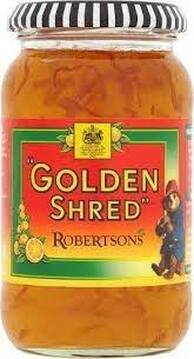 The word marmalade comes from ancient Greek words for honey and apple.
The word marmalade comes from ancient Greek words for honey and apple.The Greek word for honey is meli, from the Proto-Indo-European (PIE) root melit (honey). The Greek word for apple is melon. Put these Greek words together and you get melimelon—a concoction made by mixing honey with apples. Latin melimelum comprised honey and an apple-quince mixture.
The word marmalade, a preserve or confection of pulpy consistence made from honey and quince, came to English in the 1530s, from French marmelade and Portuguese marmelada (quince jelly). Quinces were once a very popular fruit; however, because they are very hard and take a lot of time to prepare for eating, they have fallen out of favor.
Marmalade is neither a jam nor a jelly. Today marmalade is made from the juice and peel of citrus fruits boiled in sugar and water. Very briefly, a jam is mainly fruit; a jelly is gelled fruit juice with the fruit pulp and peel removed. A marmalade is gelled fruit juice that contains the fruit pulp and peel, particularly orange peel, which gives it a distinctive bittersweet taste.
Originally, in the 16th century, marmalade was something eaten in the evenings like a dessert or snack. The Scots moved marmalade to the breakfast table and by the 19th century the British had turned to this practice as well. In 1864, the Scottish grocer James Robertson created the popular brand of marmalade that still carries his name.
-o-
Speaking of fruit: Originally, the English word apple was a generic term for any kind of fruit, except berries. For example, dates were known as fingerappla, literally ‘finger apples’. In the 14th century, an appel of paradis was a banana. When pineapples first appeared in England in the late 14th century, they got their name because their shape resembled a pinecone; hence a ‘pinecone fruit’ or ‘pine apple’. This is analogous to the French use of pomme de terre (apple of the earth) meaning potato. It was only in the 18th century that we now know as apples came to be called apples.
Reference: Online Etymological Dictionary, https://www.etymonline.com/
David’s Wordshop Blog: http://www.davidtickner.ca/blog
www.davidtickner.ca
Published on May 29, 2022 07:35
May 23, 2022
Bleisure
 How do you feel about the word bleisure? A word which combines business and leisure.
How do you feel about the word bleisure? A word which combines business and leisure.How about the word jobliday? Working while you are on holidays. Or the word plork, a combination of play and work.
Or how about hoffice? I just made up that one. Or hork? Working from home. “If you need me, I’ll be horking at the hoffice today.”
Would you use such words in public? Maybe they will catch on like staycation. Maybe not.
Such words are called portmanteau words—parts of two different words jammed together to make a new word. Other examples include blog (web + log), podcast (iPod + broadcast), brunch, smog, cosplay, romcom, and many others. Such words were popularized in the 19th century by Lewis Carroll—chortle is one of his creations (chuckle + snort).
Portmanteau words are not to be confused with compound words--two complete words joined together to create a new word; e.g., airport, anyhow, backfire, baseball, doorknob, keyboard, peppermint, whiteboard, and hundreds more.
Reference: Online Etymological Dictionary, https://www.etymonline.com/
Bartleby. (7 May 2022). Suntan lotion, laptop charger. The Economist, 59.
Published on May 23, 2022 12:36



